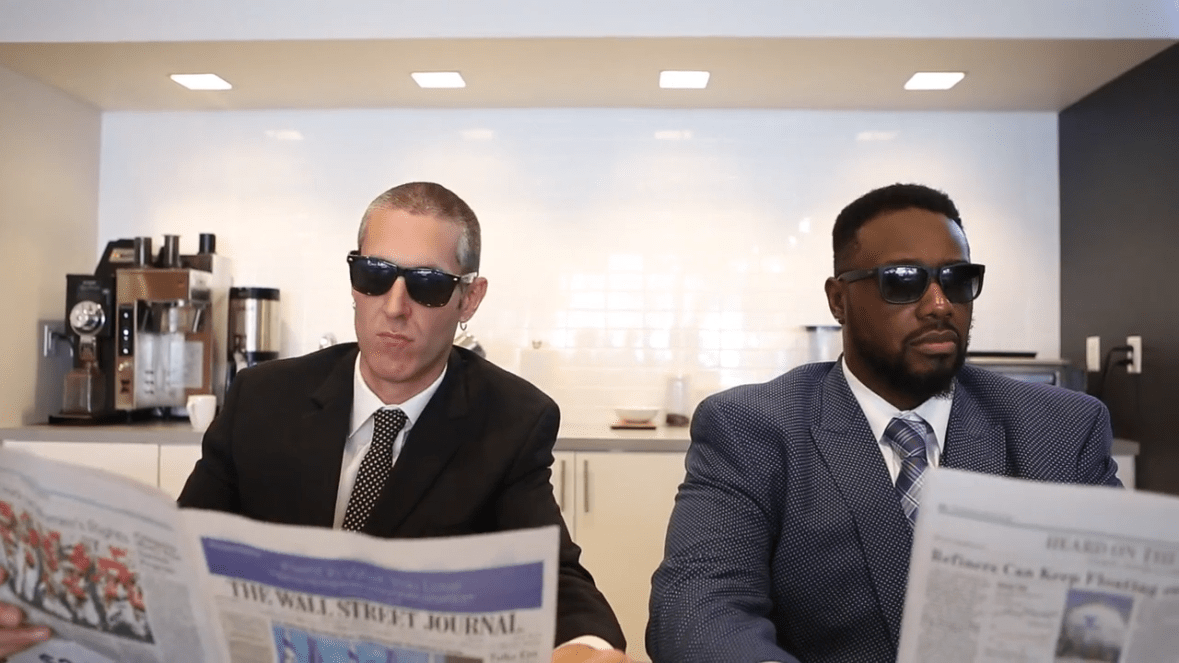The Foreign Exchange’s ‘Connected’ is 20 years old. It set a blueprint for my own life
Nicolay and Phonte Coleman as “The Foreign Exchange” in the “Asking for a Friend” music video. (Screenshot via YouTube)
OPINION: The duo of Phonte Coleman and Nicolay showed us a new way to create timeless music and art, a way that affected my own life in tremendous ways.
Editor’s note: The following article is an op-ed, and the views expressed are the author’s own. Read more opinions on theGrio.
I recently threw out about 95% of my physical compact disc (CD) collection. I didn’t want to, but they’ve been sitting in boxes in my storage for the past four years, unopened, in a back corner — it was time.
Of course, as soon as they were gone, I had immediate anxiety about the collection of music I’d just dedicated to a landfill. Sure, most of that music is probably on streaming services, but I don’t even know all of the albums I threw out, which means for the more obscure music, I will probably never hear it again. And there were hundreds of mixtapes and albums I burned myself, including Little Brother’s debut album “The Listening,” which I burned to CD using the University of Maryland-College Park’s finest ethernet connection. My version of “The Listening” included songs that ended up on the final released album and some songs that ended up being on The Foreign Exchange’s “Connected” album, which turns 20 on Aug. 24, and at the time, was one of the most different sounding hip-hop albums I’d ever heard.
The first song I heard from The Foreign Exchange, the collective of rapper/lyricist Phonte Coleman and producer Nicolay, was “Nic’s Groove,” a song I thought was on “The Listening” (because I downloaded that whole album together and it was part of that batch of songs) but didn’t sound like it fit. Once I learned that this song was for a different, more musical project, I couldn’t wait to hear it because I loved “Nic’s Groove,” and still do today. As a musical production, it is perfect.
The album was worth the wait. “Connected,” was a revelation of a project. While it didn’t sound like “traditional” hip-hop (at the time), it was a hip-hop album, through and through. It also demonstrated how multifaceted and talented Phonte is as an artist. Over a lot of synthesizers and melodic chords, Nicolay created the perfect music sound beds for Phonte to explore his various skill sets. From rapping and singing to adding harmony where appropriate, Phonte became a revelation as an artist; there’s a reason that Drake, one of the most famous artists on the planet has called Phonte, and Little Brother, an influence. It put hip-hop in a different light. While Kanye West took over hip-hop and gave every kid from the suburbs a license to pick up a microphone, “Connected” had a neo-soul vibe, but for rappers.
Music
It turns out you can spit real-life bars on slow synths, muted drums and an assortment of keyboard patches, which isn’t novel or original in 2024, but in 2004, wasn’t the norm. For a group trying something different, Phonte and Nicolay showed up and showed up big. Upon relistening to the album, I couldn’t help but feel like if this very album were released today, it would be welcomed with even more open arms than in 2004, when it was a critical darling and lauded by every outlet.
Interestingly, The Foreign Exchange also set a blueprint for the future in how you could work together without sitting in a room together. On a personal level, Damon Young and I, when creating our now defunct, award-winning website, Very Smart Brothas, used The Foreign Exchange as a North Star of sorts. “Connected” was crafted entirely without Phonte and Nicolay meeting in person, but by piecing the entire album together through email and instant messaging. Damon and I didn’t meet for the first time until our first book release party in Washington, D.C., in April 2011, three years after we started the blog with Liz Burr. We wrote and published a book together without meeting in person and rarely speaking on the phone. We pieced the book together, similarly, via email and instant messaging. While we didn’t title our book “Connected,” we certainly could have and the message would have worked as well as it did for The Foreign Exchange.
In 2024, I often revisit “Connected” because it reminds me of a younger, more fun time in my life. I’d just started blogging a few months before the album was released; music felt so fun and interesting and soundtracked so many of the summers and best weeks of my life then. “Connected” is one of those albums that connects me, no pun intended, to a time in life that has real memories attached to it. For that, it will always be an album that holds significance in my life.
We’re connected, now, and forever.
Panama Jackson is a columnist at theGrio and host of the award-winning podcast, “Dear Culture” on theGrio Black Podcast Network. He writes very Black things, drinks very brown liquors, and is pretty fly for a light guy. His biggest accomplishment to date coincides with his Blackest accomplishment to date in that he received a phone call from Oprah Winfrey after she read one of his pieces (biggest) but he didn’t answer the phone because the caller ID said “Unknown” (Blackest).

